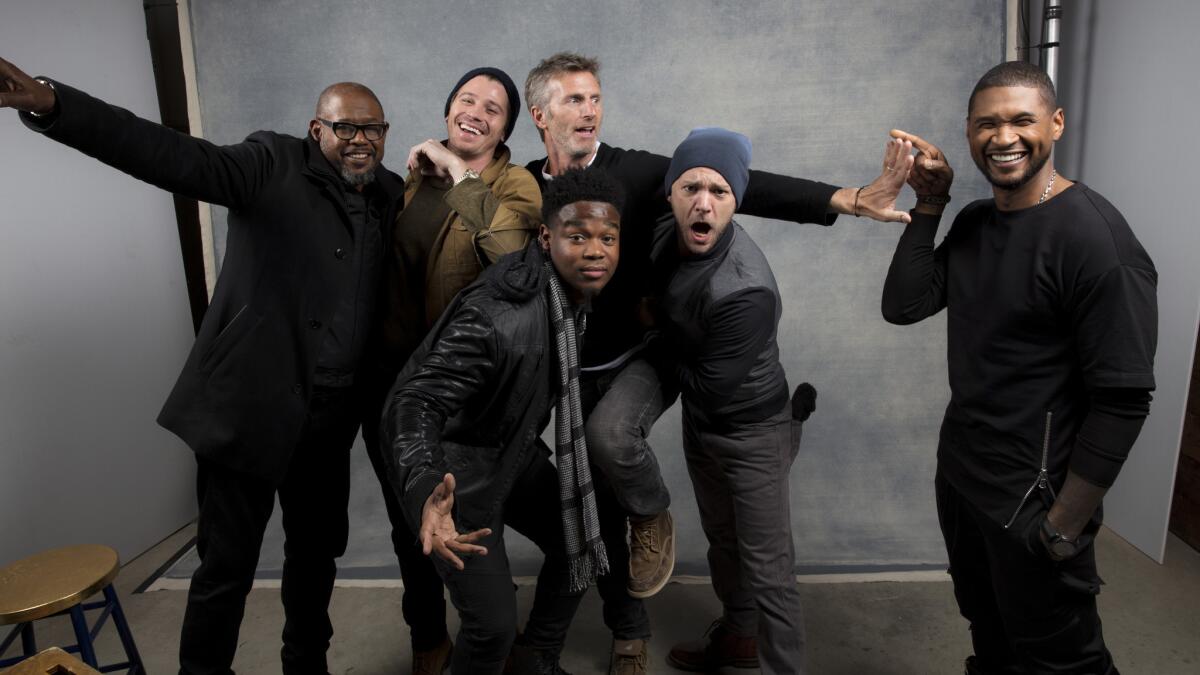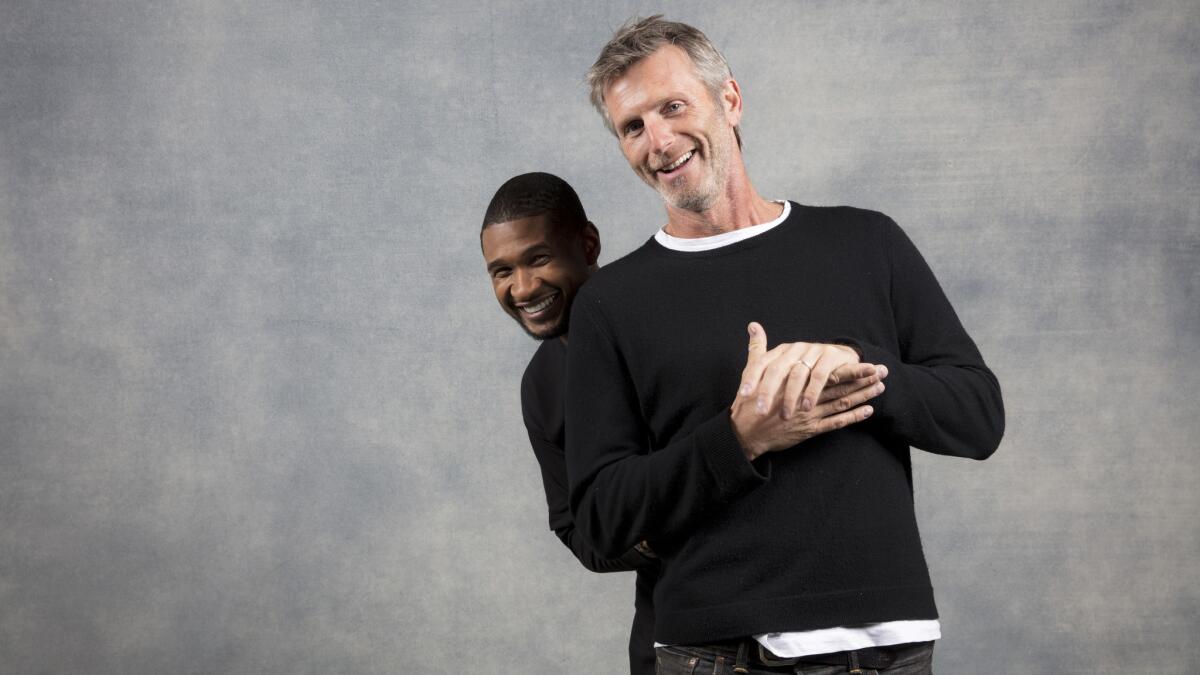Inside the 20-year journey to bring Sundance prize-winner ‘Burden’ to the screen
- Share via
Andrew Heckler has waited nearly two decades for this moment.
The first-time writer-director has been fighting to get his directorial debut, “Burden,” a redemption story about a Ku Klux Klan member who has a change of heart, onto the big screen since 1996, when he came across the unlikely true story in a newspaper.
“I read a blurb and it basically said, ‘Klansman opens up a Redneck Shop and KKK museum in Laurens’ — a small town in South Carolina,” he said. “I put it in my folder of ideas I wanted to pursue, but before I could get back to it, I read another article about eight months later that said, ‘Klansman sells Redneck Shop and KKK museum to black Baptist church.’ At that point I just couldn’t believe it, so I went down there.”
Heckler spent two weeks in Laurens, meeting with the Rev. Kennedy, the leader of the church, and Mike Burden, the former Klansman whose girlfriend, Judy, managed to convince him to leave the Klan for good. He also visited the shop, posing as a member of a white supremacist group, where he was eagerly welcomed.
“I had to swallow a lot of my own ideologies, perspectives and philosophies because they’re diametrically opposed to the Klan,” Heckler said. “I tried to really listen and learn and try my best to empathize and understand where they were coming from. No one comes out of the womb in a white hood and a robe; we’re taught racism. So how do you unlearn it?”
Upon returning home, it took about two and a half weeks for Heckler to write an initial draft. More than 20 years later the film is finally in theaters, kicking off its specialty run on five screens in New York and Los Angeles this weekend.
Garrett Hedlund stars in “Burden” as a South Carolina man who turns to an African American preacher for help leaving his racist past behind.
“I felt like I knew the story so well that it just evolved out of me onto the page,” Heckler said. “And then I went into 15 years of rewrites. The development process was 15 years, but the initial inception of the idea was very quick. I felt like I had an instinctual feel for the story.
“It’s the second screenplay I’ve ever written, and for me, it’s just the one. This has always been the most powerful story that I’ve ever come across. It was the story that I always wanted to tell.”
Initially “Burden” was greenlit in 2015 as one of the launch titles for Relativity Media’s specialty division Relativity Squared, which was run by Robbie Brenner. That plan hit a snag when the studio went bankrupt in 2016, but Brenner — who remained a producer on the film — was committed to seeing the project through.
“She’s relentless,” Heckler said. “She wouldn’t give up on this movie. Every meeting, everything she did, she would bring up ‘Burden.’”
The film — which stars Garrett Hedlund and Andrea Riseborough as Mike and Judy Burden, Forest Whitaker as the Rev. Kennedy and Usher Raymond as Clarence Brooks, Mike’s childhood friend — found financing and premiered as a sales title at the 2018 Sundance Film Festival.

Although it scored a coveted slot in the U.S. dramatic competition and won the festival’s audience award (beating out contenders including “Eighth Grade” and “Sorry to Bother You”), the film virtually disappeared for the next two years.
“It was just a perfect storm of things at Sundance that year that really prevented a sale,” Heckler said. “The streamers came out for the first time and said, ‘We’re not in the acquisition business, we’re going to make our own movies,’ and you had the Harvey Weinstein implosion and Time’s Up. Also swirling around was the lack of diversity in the film business. And we all know in the movie business, the second you start losing heat on something it’s very difficult to regain it. So it was brutal for us. It was brutal for me.”
While there were significant sales out of Sundance that year (including “Assassination Nation,” “Searching” and “Sorry to Bother You”), the festival’s dramatic competition did produce fewer splashy sales titles than usual. “The Miseducation of Cameron Post,” which won the competition’s jury prize, also struggled to find a buyer. It ultimately landed at FilmRise, was released in the summer of 2018 and made under $1 million in U.S. theaters.
In addition to the uncertain market for independent films, “Burden” also faced the challenge of telling the story of a Klansman’s redemption just a few months after President Trump declared there were “very fine people on both sides” of the tragic events of the 2017 white nationalist rally in Charlottesville, Va.
“While it won the audience award and people loved it, I think [distributors] wondered, ‘Is this something that people want to see? Is it too much? Is it too timely?’ ” Brenner said. “I think it was a lot of time and circumstance.”
Still, the Sundance reception was proof to the filmmakers that “Burden” could connect with audiences. Eventually the film found a home with the fledgling 101 Studios, which was launched by former Weinstein Co. executive David Glasser in 2019.
“We came into it about seven months after Sundance,” Glasser said. “I think the movie is an incredible tour de force, but I also think movies like this take a lot of work to release and find their audience. ... This is the kind of movie we understand how to release.”
Though the movie touches on themes of racial solidarity and intolerance, ultimately the story is about the healing potential of love, Brenner says.
“This is not a movie about black and white or racism,” she said. “It deals with those themes, but that’s not what Andrew wrote it for when he wrote it. It’s really a movie about love.” Hatred is “a learned behavior,” she said. “And if you can be taught to hate, then you can be taught to love.”
Besides the distribution challenges, the film struggled to cast Klan leader Tom Griffin, Mike Burden’s father figure. “We tried to find someone [while] leading up to the 2016 elections, and it was very difficult to get an American actor to play that role,” Heckler said. “Many of them said, ‘Look, I just don’t feel like inhabiting that character right now.’”
Eventually, Tom Wilkinson was cast. “He just read the script and literally called us the next day and said, ‘I’m in.’ He didn’t have any of those misgivings.”

After watching one of his interviews, Heckler approached Usher about playing Mike’s childhood best friend Clarence. “I was looking for someone in Clarence that was honest, truthful and very plain-speaking,” Heckler said. “You don’t get to be Usher by being lazy. He did so much work and preparation that when he showed up on set, he felt like Clarence.”
The music star is relieved the film is finally getting its chance in theaters and believes the timing is right.
“This film feels like a relevant conversation,” Usher said. “I think we need more empathy. The only way we can get it is by having those stories of redemption. It’s the only way that you can see that equality is truly obtainable is to be able to have points of reference where you know it’s worked out.”
“I think the movie is really what people need right now,” Brenner agreed. “Some sort of hope, message and understanding that in the face of adversity we can change.”
“I’ve been fascinated for 20 years to tell the story of ‘Burden’ because it is the potential for a pathway out of this mess of bigotry and hatred,” Heckler said. “The pathway is not an easy one, though it seems incredibly simple in theory. But you can’t turn an enemy into a friend through hate; you can only turn an enemy into a friend through love.”
Times film critic Justin Chang is keeping a regular diary over the course of a week at the 2018 Sundance Film Festival.
More to Read
Only good movies
Get the Indie Focus newsletter, Mark Olsen's weekly guide to the world of cinema.
You may occasionally receive promotional content from the Los Angeles Times.









